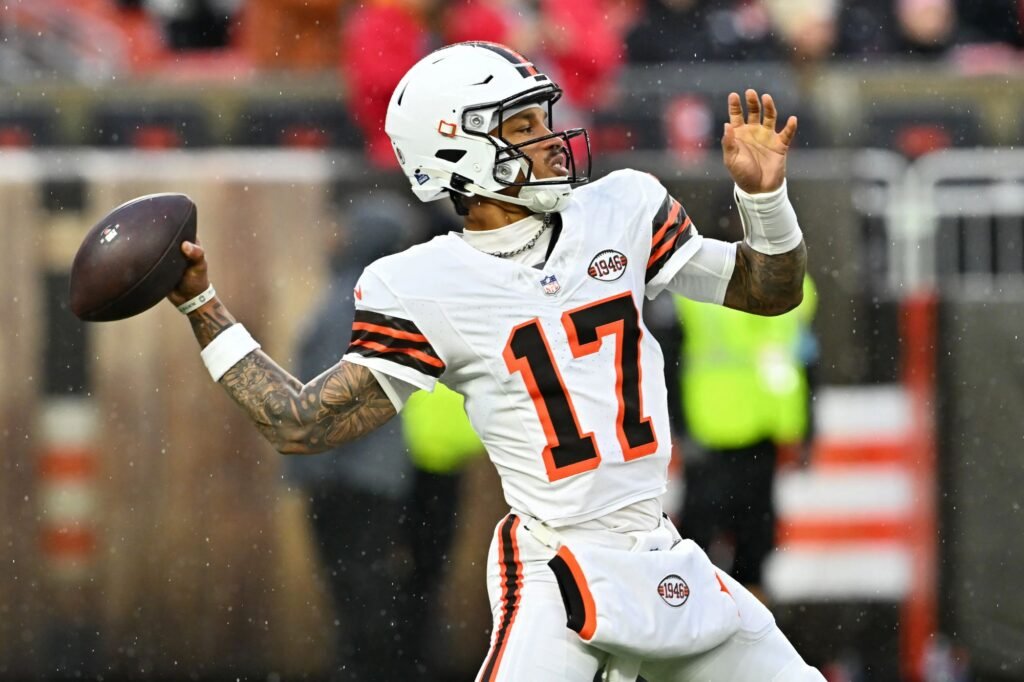In the final weeks of the fantasy football season, several NFL teams are shaking things up with quarterback changes, leaving fantasy managers scrambling to adapt their strategies. These unexpected moves are creating ripple effects for key offensive players and introducing uncertainties for those vying for playoff spots in their leagues.
The Cleveland Browns are turning to rookie quarterback Dorian Thompson-Robinson as their starter, replacing Jameis Winston. This shift raises concerns about the performance of wide receiver Jerry Jeudy, whose production heavily relies on a consistent quarterback. While Thompson-Robinson has shown flashes of potential, his inexperience could limit the Browns’ passing game and, in turn, Jeudy’s fantasy value.
In Atlanta, the Falcons have decided to start Michael Penix Jr., replacing veteran Kirk Cousins. Penix Jr., known for his strong college performance, now faces the challenge of leading an NFL team under immense pressure. This transition casts a shadow over the outlook for wide receiver Drake London, who has been a reliable target this season. Fantasy managers are watching closely to see if Penix can establish chemistry with London quickly enough to salvage his value.
The Titans are sticking with Mason Rudolph as their starting quarterback, a decision that doesn’t bring much optimism for fantasy managers. While Rudolph has been serviceable, his limited upside has kept the Titans’ offense, and by extension its fantasy contributors, in a state of mediocrity.
The New Orleans Saints have named Spencer Rattler as their starter, with Alvin Kamara likely sidelined due to injury. Rattler’s promotion adds an element of unpredictability to the Saints’ offense, which could affect the fantasy performances of wide receivers Chris Olave and Michael Thomas. Rattler’s ability to manage the offense efficiently will be critical in determining whether these players can maintain their value in the final weeks of the season.
The New York Giants are bringing back Drew Lock as their starting quarterback. While Lock has had some bright moments, his inconsistency makes him a risky play for fantasy managers. The Giants’ offense as a whole could see a dip in productivity, leaving players like Saquon Barkley and Darren Waller with uncertain outlooks.
These quarterback changes are forcing fantasy managers to reassess their lineups and strategies as the season approaches its climax. For those relying on players like Jerry Jeudy, Drake London, or Chris Olave, the uncertainty surrounding their quarterbacks adds an extra layer of complexity to decision-making.
Experts suggest that managers keep a close eye on how these quarterbacks perform in their new roles over the next week. Monitoring target shares, passing attempts, and overall offensive efficiency will be crucial in determining whether to stick with these players or seek alternatives on the waiver wire.
While these changes create challenges, they also present opportunities. New quarterbacks often rely on short, high-percentage passes, which could benefit running backs and tight ends in these offenses. For example, if Penix Jr. struggles to connect with Drake London on deep passes, players like Bijan Robinson could see an uptick in targets and production.
Similarly, Spencer Rattler’s tendency to rely on quick reads might boost the value of Saints tight end Juwan Johnson, making him a potential sleeper pick for fantasy managers.
Navigating the uncertainty of late-season quarterback changes requires a mix of caution and boldness. Fantasy managers should:
1. Monitor News Closely: Stay updated on team announcements and injury reports to understand how these changes might evolve.
2. Analyze Matchups: Consider the defensive matchups these new quarterbacks will face in the coming weeks. Favorable matchups can often offset inexperience.
3. Diversify Risk: Avoid relying too heavily on players from teams undergoing quarterback transitions. Seek stability from other positions or teams.
4.Be Proactive:Use the waiver wire to pick up emerging options, such as backup quarterbacks or running backs who might benefit from these changes.
As the NFL regular season winds down, the impact of these quarterback changes will become clearer. For now, fantasy managers must navigate this uncertainty with a mix of strategy and adaptability, ensuring they maximize their chances of success in the crucial final weeks.
While these changes may seem daunting, they’re a reminder of the dynamic nature of football and the need for flexibility in fantasy sports. The ability to pivot and make smart decisions in response to these developments could be the difference between securing a championship or falling short.


